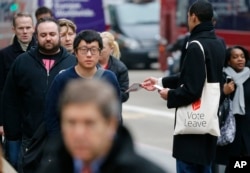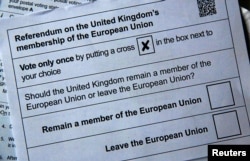As Britain contemplates leaving the European Union with a June 23 referendum, Russia is seen as one of the few countries in Europe favoring a so-called “Brexit” from the EU.
While pubs in Britain are buzzing with debate over whether to leave the European Union, at those in Russia, many locals support a Brexit.
"I think England is such a distinctive country that they really don't need the European Union, because they are already distanced from those union governments,” radio presenter Marina Karpova said while tucking into some traditional pub food at Molly Gwynn's in Moscow. “I think they'd get on wonderfully outside the European Union."
Other Muscovites disagree.
"They have support from all of Europe,” said amateur athlete Farukh Mukhmadeev, across from the British Queen pub and just around the corner from Moscow’s Bolshoi Theater. “If they exit, then they'll become independent and thus economically vulnerable and maybe more. So I think it's better for them to stay in the EU.”
More frequent rhetoric
The Kremlin has taken no official position on the Brexit, or any other possible departures from the EU. But since Western sanctions were enacted over Russia’s actions in Ukraine, there is more frequent anti-EU rhetoric from Russian politicians and state-controlled media.
Some Russians repeat Kremlin propaganda claims that Britain, as part of the West, aims to weaken Russia, regardless.
"Even if formally England exits the European Union, its connections will remain intact. It will still work and do everything it can to harm Russia,” said Nadezhda Stepanova, standing just meters from where a Congolese man dressed as a British ceremonial guardian known as a Yeomen Warder, also called a Beefeater, hands out fliers for the British Queen pub.
Russian support for European politicians and groups who want their countries to break away from the EU, or Brussels-centralized policies, and its Western allies has been evident. Russian state bank loans have gone to the French far-right party of Marine Le Pen, and the Kremlin has courted Euro-skeptics across the political spectrum.
“Russia is openly supporting political forces on the radical left and on the radical right that are openly against the idea of the European Union and calling for the abolition of the European Union,” said Peter Kreko, director of the Political Capital Institute research institution in Budapest, via Skype.
Political analysts say the Kremlin hopes a British exit will weaken European resolve against a resurgent Russia and lead to the lifting of Western sanctions. Although still marginal, European political voices have grown in France, Germany, Greece and other nations calling for the sanctions to be removed.
Departure of a foe
With a Brexit, the EU would lose one of its strongest opponents of Russian influence in Europe, Kreko said.
“So it's partially about disintegrating the European Union as a whole and destabilizing it,” he said. “On the other hand, this is also about Great Britain, which is one of the fiercest critics of Vladimir Putin's Russia.”
Weakening the EU as such, however, is not so much the Kremlin’s goal, according to Alexander Baunov of the Carnegie Moscow Center.
Despite the sanctions and political tensions, the EU remains Russia’s largest trading partner. “So poorer European Union means poorer Russia, actually,” Baunov said. “And weaker European Union, economically at least, means weaker Russia.”
The Kremlin’s goal is to quiet those voices in the EU it considers hostile toward Russia. “Less hostile mean(s) ... turning some blind eye(s) toward some Russian ambitions, like integration of the post-Soviet space ... around Russia,” Baunov said.
An EU without Britain might waver on sanctions against Russia and further embolden Putin's ambitions.







